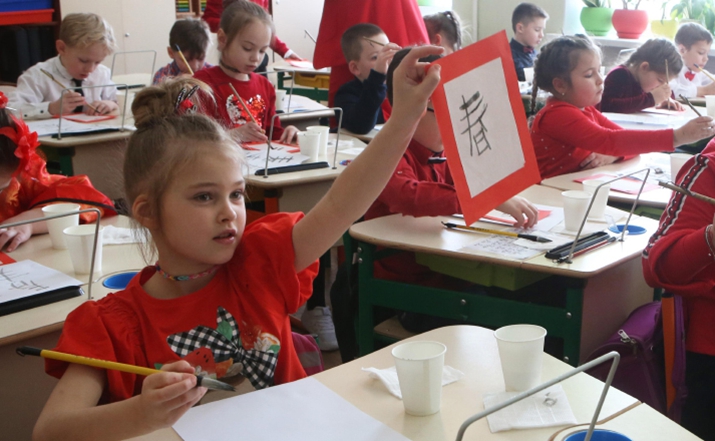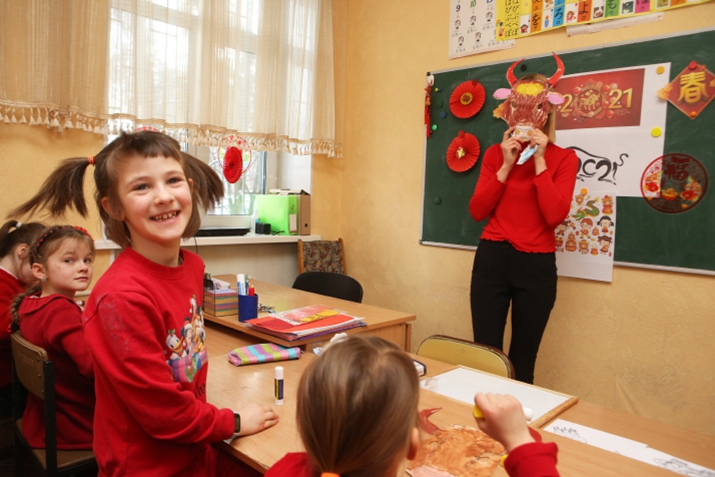| Lifestyle |
| The Chinese language sees a surge in international use and foreign enthusiasts | |
|
|
 Students practice their Chinese calligraphy at the Kiev Gymnasium of Oriental Languages No. 1 in Kiev, Ukraine, on February 15 (XINHUA)
When did Chinese char-acters come into this world? Ancient Chinese mythology claims this took place on an April 20, or so, some 5,000 years ago. Legend has it that Cangjie, the Grand Historiographer of Huang Di (the Yellow Emperor), one of the most legendary Chinese sovereigns and cultural heroes, had been tortured by the inaccurate results of keeping track of historical records via the tying of knots. One day, having been inspired after taking closer note of animal tracks, Cangjie felt compelled to create written characters that would replace the error-prone process of knot-tying, signaling a new era of Chinese civilization. As the folklore continues, being touched by the power of this written language, the heavens rained down grain upon the fields, and ghosts were heard howling throughout the long night. And that is why the sixth of the 24 solar terms on the traditional Chinese lunar calendar was named Guyu, literally meaning grain rain. Furthermore, as this period of rainfall is imperative for prosperous crop growth, Guyu heralds the end of winter's harsh weather conditions and the start of a hopeful and warm season. In 2010, when the UN first established language days for each of its six official languages, April 20, in honor of Cangjie and his contributions to the Chinese language, was selected as the UN Chinese Language Day. The day has since become an opportunity to dive into Chinese history and understand the Chinese language, one of the world's oldest languages as well as one of its most widely spoken ones. Chinese Language Day The UN Chinese Language Day was established to promote multiple languages and cultural diversity as well as to inform the general public about the history, culture and achievements of the six official languages of the UN. The theme of this year's UN Chinese Language Day is "Highlighting Pictographs" as pictographs are the origins of Chinese characters. The three-day events highlighted pictographs (Liangzhu inscribed symbols, the oracle bone script and Dongba script)associated with three sites, Liangzhu in Zhejiang Province, Anyang in Henan Province and Lijiang in Yunnan Province, according to Xiao Dun, Vice President of the UN Staff Recreation Council Chinese Book Club. "The Chinese language, written in Chinese characters, is the manifestation of Chinese wisdom as well as a common asset of all mankind," Zhang Jun, China's permanent representative to the UN, addressed this year's UN Chinese Language Day on April 20. This year's events, all carried out online due to the COVID-19 pandemic, included a museum guided tour, a language class and a lecture. He encouraged more people to use the Chinese language as a means of learning more about China and the UN. "We hope that the UN will continue to uphold multilingualism and strive to achieve equality in the use of Chinese and other official languages," the ambassador said. The Chinese language, he continued, has witnessed the history of the UN's founding and China's participation in UN endeavors. "In the five decades since the restoration of its lawful seat in the UN, China has actively participated in the UN's undertakings, firmly upheld the UN-centered international system and the international order underpinned by international law and made significant contributions to world peace and development."  Students take a Chinese Spring Festival themed crafted class at the Kiev Gymnasium of Oriental Languages No. 1 in Kiev, Ukraine, on February 15 (XINHUA)
Cultural identity Culture and language are the most significant aspects of one's cultural identity. The UN has 193 member states, but the languages the UN staff speak outnumber 193. This is because many countries have several dialects, regional languages, and official languages. The ability to communicate in multiple languages is a key tenet of the UN, and at this time of deep division over multiple crises, the belief is that speaking each other's languages can make a difference in bridging disagreements. Language days were established to promote the equal use of the six official UN languages. Today, the UN Chinese Language Day is gradually becoming an international festival for the Chinese language, Yong Ho, former Chinese Language Supervisor of the UN, said to Beijing Review. The UN's commitment to multilingualism is not just a matter of box-ticking, but a commitment to greater mutual understanding. As its website notes, "By promoting tolerance, multilingualism also ensures increased participation of all member states in the organization's work, as well as greater effectiveness, better outcomes and more involvement." The Chinese Book Club has organized a series of events at the UN Headquarters in New York during the past years, such as painting and calligraphy exhibitions, folk music performances, tea art demonstrations and lectures, showcasing the Chinese language and the profound Chinese culture to UN staff and diplomats from all over the world. Further, the UN World Tourism Organization (UNWTO) has announced that starting from January 25, the Chinese language has formally become an official language of the UNWTO, thus improving the status and proportion of the use of Chinese in international organizations. This year's Chinese Language Day was celebrated with a video festival at the UN Offices in Geneva (UNOG) for the first time, with the theme of Spring. "Spring is what I like very much, a beacon of hope, especially in difficult times. Therefore, I think it is very meaningful to choose the theme of spring for Chinese Day this year," Michelle Keating, Chief of Language Services of the UNOG, said in an interview with China Media Group. She also noted that on average about 70 new members sign up for Chinese language training courses at the UNOG each year. They sign up for classes mainly to improve their understanding of Chinese, whether this serves their professional needs or personal interest in Chinese culture. "In the new era facing new developments, international Chinese language education is making constant contributions to the advancement of exchange and mutual learning between and by the world's diverse cultures," Chen Dehai, Secretary General of ASEAN-China Center, said at the festival. Archil Kalandia, Ambassador of Georgia to China, approached this topic from his own perspective. "The Chinese language is booming in Georgia and more and more Georgian students are studying the Chinese language," he said. "In this regard, the Chinese language is adopted into the Georgian educational system as well." According to the ambassador, the Chinese language reflects the identity of the unique traditions and culture of China and brims with potential new discoveries. "If you learn Chinese and if you can speak Chinese very well, it means that you have a lot of doors open for you around the world." More development Besides the multilingualism that the UN advocates, another reason the Chinese language has been gaining more favor among the international community is China's growing national strength, which has been upgrading the country's international position since its reform and opening up. Moreover, with the increasingly frequent political, trade and cultural exchanges between China and other countries, the demand for professionals well-versed in the Chinese language continues to increase, attracting young people from around the globe to the study of Chinese. "A country's language becoming an official language of the UN will give this country a special status, because the voice of the UN is spread to the world through its official languages," Ho said. "The popularity of Chinese Language Day shows the importance of China's economic growth and increasing involvement in global affairs." Wan Lixin, a Chinese language teacher at Queen Margaret College in Wellington, New Zealand, talked about how the language could open up opportunities for students in New Zealand. For many students, China provides a bigger stage, and learning the Chinese language brings more possibilities. "Learning Chinese is unlike learning any other language. It's the language of one of the biggest populations in the world," Wan told Beijing Review. "If you know this language, you know the culture, the values, the civilization, and the minds of the people." As for learning Chinese, Erin Zhang, a sophomore at Massey University in New Zealand, admits that it is hard work, but will ultimately be rewarding. "In my personal experience, the best thing about learning languages is that you have direct access to the writings and the thoughts of people that you would not normally speak to," Zhang told Beijing Review. "If you master Chinese, you have access to this hugely fascinating culture and over 1 billion people." So far, more than 70 countries, with a combined total of over 4,000 colleges, have officially incorporated Chinese language teaching into their national education systems, including the UK, Russia, South Africa, Japan, Republic of Korea and Australia, according to Tian Xuejun, China's Vice Minister of Education (MOE). The demand for learning the Chinese language continues to soar, with the majority of overseas Chinese-language learners coming from Southeast Asia, Wu Yinghui, professor at Beijing Language and Culture University, told Beijing Review. Wu added that more than 30 million Chinese nationals reside in Southeast Asia, accounting for about 6 percent of the region's population, laying the solid foundations for Chinese-language education across the region. As cultural and economic ties between China and Southeast Asia deepen, local interest in learning Chinese also grows. According to the 2017 statistics from the Center for Language Education and Cooperation (CLEC), a non-profit professional educational institution for international Chinese language education, there are over 100 million people learning or speaking Chinese outside China. In order to regulate education in the Chinese language, the MOE and the State Language Commission jointly issued the Standard for Chinese Proficiency in International Chinese Language Education, which will go into effect on July 1. To guide all aspects of Chinese language learning, teaching, testing and evaluation, this standard aims to enhance the quality of education as well as its results.  Peng Yi (left), Dean of the University of Johannesburg-Nanjing Technology University Confucius Institute, gives advice to a South African tourist guide attending a standard Chinese training program in Pretoria, South Africa, on March 18 (XINHUA)
New trend Harue Shi, a 25-year-old Japanese student at Yamaguchi Prefectural University in Japan, holds a multifaceted fascination with Chinese TV series. "Watching Chinese TV dramas can improve my Chinese proficiency, and I can also learn a lot of things related to China. The process of watching TV dramas makes me feel happy," she told Beijing Review. Based on the novel by Ma Boyong, The Longest Day in Chang'an was the first show to catch Shi's eye. Set in the Tang Dynasty (618-907), the series has received high ratings on both Amazon Prime and IMDb. Many foreign viewers like its intense plotlines, which took place within a span of only 24 hours. Some even consider it an epic based on its exquisite historical settings and costumes, superb cinematography, and an in-depth portrayal of people's lives in the Tang Dynasty. This international enthusiasm for Chinese dramas continues to swell with the emergence of several original, high-quality productions. However, one of the greatest challenges for Chinese TV series going global is the language barrier. As there are huge differences between East and West, foreigners cannot fully grapple the plot without the help of subtitles or other ways of translation. This way, learning the Chinese language has become the better choice for many foreign audiences. Compared to the dubbed version, Shi prefers to watch the original Chinese TV series. Watching these shows has become her go-to for improving her listening skills, adopting new words and phrases, and learning more about different aspects of Chinese culture. (Print Edition Title: The Language of Spring) Copyedited by Elsbeth van Paridon Comments to taozihui@bjreview.com |
|
||||||||||||||||||||||||||||
|
